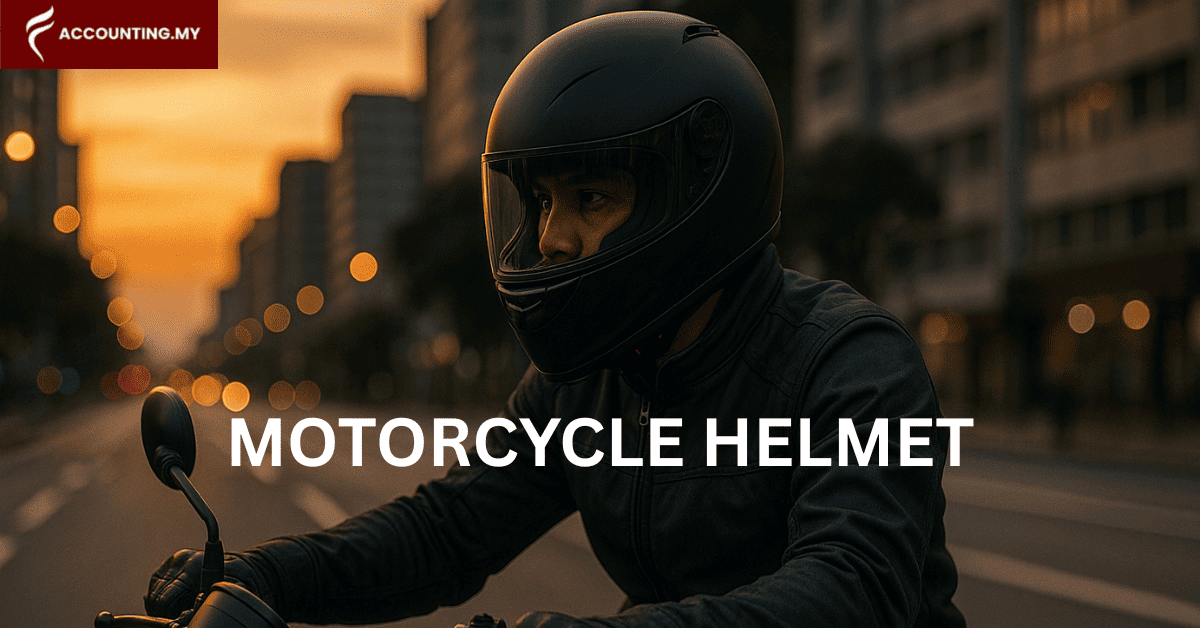Short answer: No, not all helmet motor are legal under JPJ rules.
In Malaysia, motorcycle riders are required by law to wear helmets that meet specific safety certifications. While many helmets may look stylish or tough, using the wrong one can lead to JPJ fines, insurance issues, and even higher injury risk in an accident.
If you’re unsure whether your helmet is legal, this guide will walk you through Malaysia’s helmet laws, which types are allowed, and how to spot a JPJ-compliant model.
Why? Because samans aren’t worth it, and you don’t want to gantung license over a helmet. Really, that would suck.
What Is the JPJ Helmet Law?
JPJ (Jabatan Pengangkutan Jalan) mandates that all motorcycle helmets used on public roads in Malaysia must be certified, either by SIRIM (Malaysia’s national standard) or by internationally recognised safety bodies. They do through the:
- Motorcycles (Safety Helmets) Rules 1973
- Road Transport Act 1987 (Sections 66 & 119)
In other words, legally approved helmets must show a SIRIM label. This law ensures that your helmet has undergone proper SIRIM MS 1:2011 standard testing.
What Is SIRIM MS 1:2011?
SIRIM QAS International is Malaysia’s national certification body. The MS 1:2011 standard defines what a motorcycle safety helmet must meet in terms of:
- Impact resistance
- Chin strap strength
- Penetration protection
- Retention system effectiveness
- Weight, coverage, and visibility
Each certified helmet receives a tamper-proof SIRIM hologram sticker, typically placed inside the helmet shell.
Why SIRIM matters:
- Recognised by JPJ and PDRM during enforcement
- Tested locally under Malaysian road conditions (You know how treacherous our roads are)
- Mandatory for insurance and accident claims compliance
What Certifications Are Accepted?
Certification | Description | JPJ Approved? |
SIRIM MS 1:2011 | Malaysian National Standard | Yes |
ECE 22.05 / 22.06 | European crash helmet standard | Yes for imported Helmets |
DOT (FMVSS 218) | U.S. safety standard | No |
SNELL | U.S. premium safety standard | No |
“Contrary to popular belief. Only helmets with the SIRIM sticker or ECE R22 are considered legal in Malaysia, even if they have SNELL, or DOT markings.”
Source: JPJ
What Types of Motorcycle Helmets Are Legal in Malaysia?
If your helmet is certified, the following types are allowed by JPJ:
Legal Helmet Types
Full Face Helmets
- Best for full protection
- Recommended for long-distance and highway riders
- Excellent in rain and crashes
Modular (Flip-Up) Helmets
- Good blend of coverage and convenience
- Ideal for city-to-highway commuters
- Flip-up front helps in petrol stops or roadblocks
Open Face Helmets
- Lightweight and cooler in Malaysian heat
- Suitable for short city rides
- Less protection for chin and face
Smart Helmets
- Legal only if SIRIM-approved
- May include intercom, HUD, GPS features
- Popular among touring and delivery riders
Not Allowed or Risky:
- Half-shell novelty helmets
- DOT-only helmets with no SIRIM label
- Shopee or overseas imports with no documentation
- Helmets with fake or removable certification stickers
If you’re shopping online, always verify the seller and look for genuine certification photos, especially if the price seems too good to be true.
What Happens If You Use an Illegal Helmet?
Wearing a helmet that doesn’t comply with Malaysian safety standards is more than just a bad idea, it’s a legal offence under the Road Transport Act 1987.
JPJ and PDRM regularly conduct roadblocks and spot checks to enforce helmet regulations, especially in urban areas, highways and during festive seasons like raya or CNY.
Penalties & Legal Consequences
According to Section 119(2) of the Road Transport Act 1987, failure to wear a properly approved helmet can result in the following:
- Compound fine of up to RM300
Riders caught using non-compliant helmets are typically issued a compound fine under JPJ Rule 4A of the Motorcycles (Safety Helmets) Rules 1973. - Helmet seizure by authorities
JPJ and police officers are authorised to confiscate helmets that appear illegal, fake, or do not meet certification standards. This can happen immediately during roadblocks. - Legal summons or prosecution (in serious cases)
Repeat offenders, or riders involved in accidents while wearing illegal helmets, may face court proceedings or higher penalties under Sections 66 & 119 of the Act.
Insurance Complications
Using a helmet that isn’t legally certified could affect your motor insurance claim after an accident. Some insurers may:
- Reduce claim payout
- Reject claims altogether if it’s proven that non-compliant gear contributed to injury severity.
This means that even if the accident wasn’t your fault, your choice of helmet can cost you compensation.
How to Check If a Helmet Is JPJ-Legal (Checklist)
Now we know it’s a really bad idea to use a fake or counterfeit helmet, here is a handy-dandy list before you buy or ride:
- SIRIM sticker or hologram
- Full-face, modular, or open-face helmet structure
- Visor and strap in good working condition
- Reputable seller (official store or authorised dealer)
Avoid:
- No documentation
- Helmet from unknown brand or seller
- Just a sticker with no test info
Where to Buy JPJ-Approved Motorcycle Helmets
Buy your helmet from trusted sources to avoid getting scammed or fined.
Recommended places to shop:
- Shopee Mall (look for Official Store badges)
- Lazada Flagship Stores
- Local motorcycle gear shops
- Pmax Motor: 100% SIRIM & ECE-certified range
And it’s just ticking off legal boxes. By getting SIRIM and JPJ approved helmets, you’ll get helmets that are:
- Crash-tested
- Legal for Malaysian roads (No saman or talking your way out during road blocks)
- Covered under return policies or warranties
6 Common Misconceptions About Helmet Laws in Malaysia
A lot of Malaysian riders unknowingly break the law because they’ve been misinformed. Let’s clear up the most common myths:
1. “I bought it overseas, that’s good enough.”
Not in Malaysia. Even if your helmet is DOT- or Snell-certified and passed customs, it does not meet Malaysian legal requirements unless it carries a SIRIM MS 1:2011 certification.
Customs clearance ≠ JPJ approval. No SIRIM, no legality.
2. “I’ve never been stopped, so I’m safe.”
You’re not “safe”, you’re just lucky.
JPJ enforcement is unpredictable. Roadblocks often happen around:
- Major festivals (Raya, CNY)
- Public holidays
- Highway exits and toll plazas
Fines and seizures can happen at any time. No one gets a warning for “almost complying.”
3. “DOT and Snell are higher standards anyway.”
That may be true in their home countries, but Malaysia doesn’t recognise DOT and SNELL alone as sufficient.
Only SIRIM MS 1:2011 and ECE certification is legally binding under Malaysian law. Remember, you are in Malaysia, not overseas.
4. “My helmet looks safe and sturdy, that’s what matters.”
Looks mean nothing to JPJ.
You might think it’s well-built, but without proper testing (impact absorption, strap retention, penetration resistance), it’s considered unsafe and illegal.
JPJ evaluates what’s inside your helmet, not how it looks outside.
5. “The shop said it’s original, that’s enough.”
Not true and scams are everywhere. Even reputable-looking stores or online listings may sell helmets without SIRIM , especially from overseas sellers.
If the helmet has no SIRIM hologram, it’s not approved, even if it’s “branded.”
6. “I’m just using it for short trips around town.”
Accidents happen even at 30km/h. Many fatal motorcycle crashes in Malaysia occur in urban areas. The law doesn’t change depending on distance. If you’re on a public road, you need a SIRIM-certified helmet.
Don’t Risk It. Ride Smart, Ride Legal
You can’t just pick any helmet off the shelf or from a Shopee discount promo. JPJ’s helmet motorcycle law in Malaysia is clear: your helmet must be certified by SIRIM, no SIRIM sticker, no dice.
Whether you ride to work, tour across states, or deliver full-time, a SIRIM approved helmet is built for your road, your style, and your safety.
A little diligence and legal compliance goes a long way, it might even save your life one day. So please, for the love of your family and friends, don’t take the risk.
Frequently Asked Questions About JPJ Motorcycle Helmet Law in Malaysia
No. DOT helmets are not legally recognised by JPJ unless they also have SIRIM MS 1:2011 certification. DOT alone is not accepted under Malaysian law.
It’s Malaysia’s official helmet safety standard. Helmets certified under this are tested for crash protection, visor clarity, strap durability, and more. Only helmets with this label are considered legal on public roads.
It’s typically found inside the shell, near the chin strap anchor, or sometimes beneath the padding. Some brands print it near the rear edge. If it’s missing, it’s not road-legal.
Yes, as long as they’re certified by SIRIM. Modular helmets are a great balance of convenience and protection, especially for urban riders.
Absolutely. Even a Shoei, HJC, or AGV helmet is illegal without SIRIM certification. JPJ enforcement is based on compliance, not brand name
Your insurer may reduce your payout or reject your claim entirely. It’s considered partial negligence for not wearing certified safety gear.















